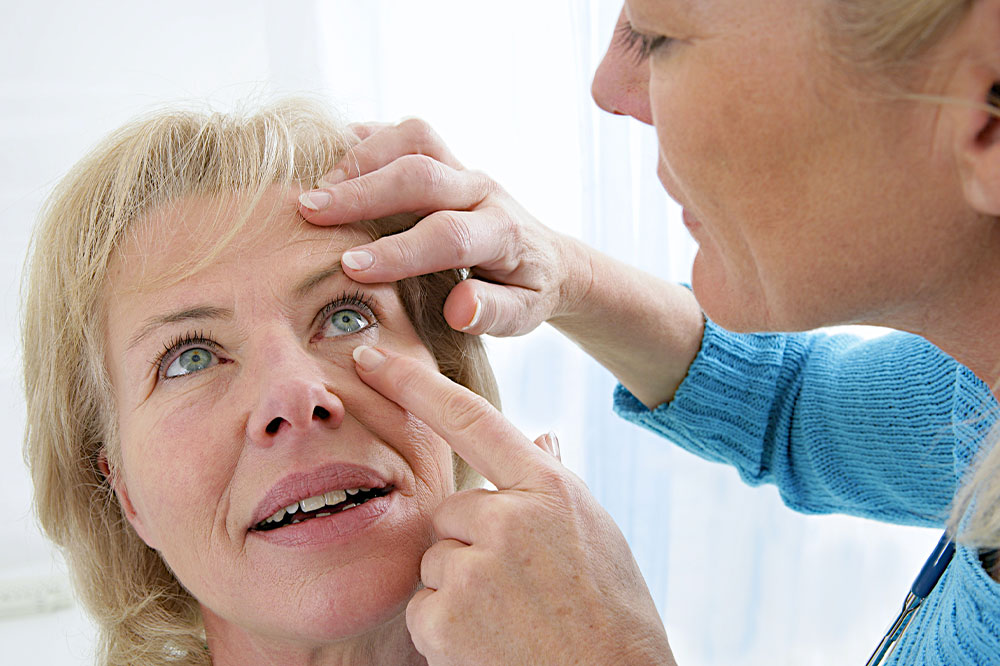Age-related macular degeneration – Causes, symptoms, and management techniques

Age-related Macular Degeneration (AMD) is a common condition that affects the macula – a light-sensitive tissue at the back of the eye. Age-related Macular Degeneration is the top cause of blindness in people over 65, affecting more than 6 million people today. As you age, AMD can cause a progressive loss in central vision (the ability to see objects clearly). It can lead to vision loss or blurriness of things you see with your central eye.
Here we will take an in-depth look at what causes AMD, how it affects your eyesight, and what treatments are available.
What is macular degeneration?
Macular degeneration is a disease that affects the macula or the light-sensitive tissue at the back of your eye. It causes blurred vision and loss of central vision (the area where you see things clearly).
This can make driving dangerous or impossible for some individuals who have lost their peripheral vision because they cannot judge distances accurately anymore.
Risk factors
In general, the following risk factors are associated with AMD:
- Age (50 or older)
- Gender (men more likely than women)
- Family history of AMD in first-degree relatives (parents and siblings), especially if there is a tendency for early onset of the condition
- High-risk factors include high blood pressure, cholesterol, smoking, and diabetes.
Symptoms of AMD
There are many symptoms of macular degeneration, including:
- Poor central vision (the ability to see objects clearly)
- Vision loss in the center of your field of vision
- Difficulty reading text or other small print
- Blurriness
What causes age-related macular degeneration?
Age-related macular degeneration (AMD) is a form of vision loss that affects the central part of your retina. It can make it hard to see faces, read, watch TV, and more. Your peripheral (side) vision may remain normal.
Experts do not know precisely what causes AMD or how people get it, but they know that smoking cigarettes increases your risk of developing AMD by 50%. Current research shows that smoking increases your risk of developing AMD by 40% – 80%.
Many treatments are available for patients with early stages of this condition, so do not hesitate to talk with ophthalmologists about options for managing any issues you may have related to this disease!
Management options of AMD
There are several treatment options for AMD, including:
Laser treatment
This can be performed on the eye’s surface or, in more advanced cases, within the back of the eye. Laser therapy is also a good option if you have cataracts but no other AMD symptoms. The laser helps dissolve blood vessels causing inflammation and pain in your eyes, preventing new blood vessels from forming so they do not become inflamed again over time (this might take months).
Drug therapy (topical medications)
There are several drugs available for treating dry eyes caused by AMD: artificial tears, anticholinergics such as tetracycline hydrochloride (a medicine used for many types of infections), cyclosporin A injection given into muscle tissue at least once daily until improvement occurs; steroids like prednisone can be taken orally as well as injected into muscle tissue regularly until improvement occurs; topical lubricants containing polyethylene glycols may help reduce sensitivity due to dryness/burning sensation.
Life-style modifications for people with AMD
- Eat a healthy meal
- Get regular exercise
- Stay socially active
- Limit consumption of hard drinks
- Get enough sleep every night—at least 7 hours per night without interruption—and try not to nap during the day.
- Manage stress as much as possible.
How to treat age-related macular degeneration?
Several things can help improve your vision if you have age-related macular degeneration. The first is to find a doctor who specializes in treating this condition. Your eye care professional will want to know all about your medical history and any other health conditions that might also affect your eyes or body.
You should follow a healthy meal plan and increase your physical activity levels by joining an exercise program or walking more often throughout the week.
In addition to getting regular eye exams at least every year, people with macular degeneration need to keep track of how much sleep they get each night because chronic lack of rest can cause further damage to their eyesight.
What are the remedies for age-related macular degeneration?
If you have macular degeneration, taking care of your eyes is essential. The best way to do this is by eating healthy meals and exercising regularly. You should also ensure that you have regular eye exams so your doctor can monitor the progression of the disease in case it progresses faster than expected.
In addition, certain medications can help prevent further damage from developing if left untreated, while others can be used as a treatment once symptoms appear (like laser surgery). To ensure all of these options are noticed and utilized, ensure you get an early diagnosis and treatment for macular degeneration!
There are currently several options to consider when managing age-related macular degeneration.
Supplements
For several reasons, following a proper meal plan is essential to managing this condition. Several natural remedies can be used to treat macular degeneration:
Vitamin C (ascorbic acid)
This vitamin acts as an antioxidant in the body and effectively reduces the effects of oxidative stress caused by free radicals in the eyes. It also helps maintain healthy endothelial cells in the retina that nourish blood vessels.
Conclusion
The best thing people can do is visit their doctor regularly for regular checkups. We hope the above options help you manage, if not cure, AMD. Proper management of AMD can help avoid losing vision once and for all. Managing AMD is a better solution to living a happy and healthy life. This includes adhering to a strict meal plan, following proper workouts, and having a positive mindset to combat any unforeseen circumstances. In case of any confusion, it is recommended to reach out to your healthcare professional.
















